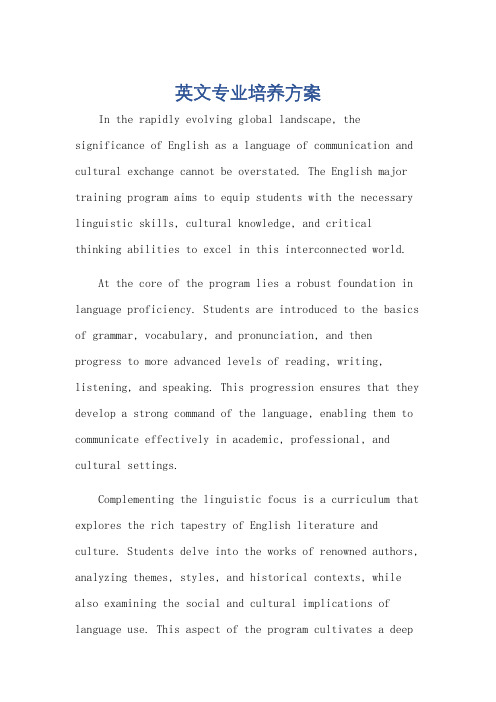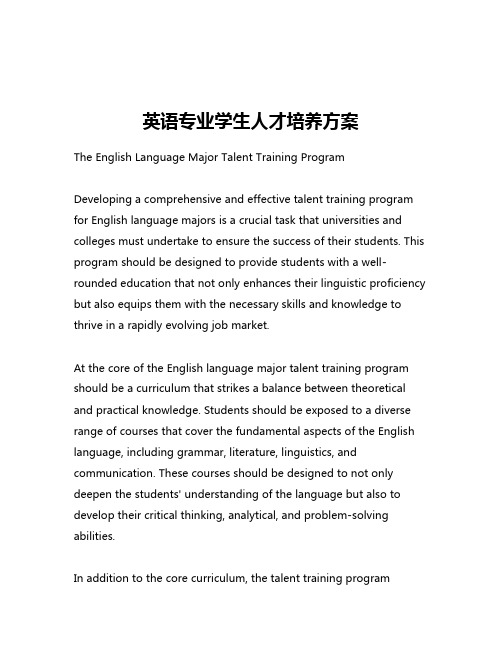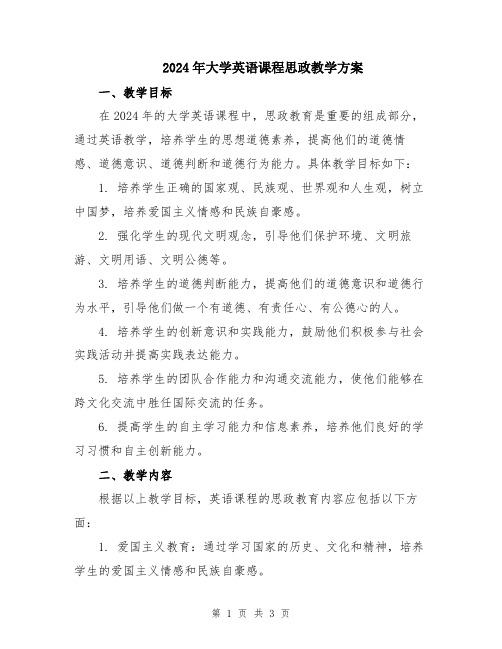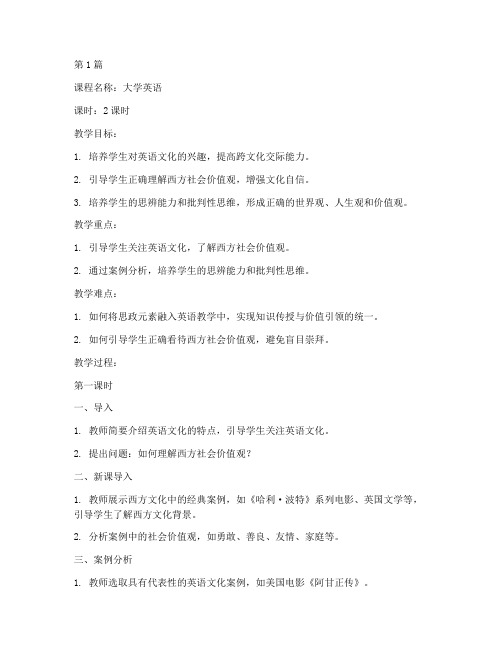马克思主义学院思政专业本科人才培养方案模板-yingwenban
英文专业培养方案

英文专业培养方案In the rapidly evolving global landscape, the significance of English as a language of communication and cultural exchange cannot be overstated. The English major training program aims to equip students with the necessary linguistic skills, cultural knowledge, and criticalthinking abilities to excel in this interconnected world. At the core of the program lies a robust foundation in language proficiency. Students are introduced to the basics of grammar, vocabulary, and pronunciation, and then progress to more advanced levels of reading, writing, listening, and speaking. This progression ensures that they develop a strong command of the language, enabling them to communicate effectively in academic, professional, and cultural settings.Complementing the linguistic focus is a curriculum that explores the rich tapestry of English literature and culture. Students delve into the works of renowned authors, analyzing themes, styles, and historical contexts, while also examining the social and cultural implications of language use. This aspect of the program cultivates a deepappreciation for the English language and its role in shaping global perspectives.In addition, the program emphasizes the development of critical thinking and analytical skills. Students are encouraged to question, challenge, and evaluate information, arguments, and perspectives presented in their studies.This approach sharpens their ability to form coherent and well-argued opinions, making them effective contributors to academic discussions and professional environments.Moreover, the program recognizes the importance of practical experience in language learning. It incorporates opportunities for students to engage in real-world language use, such as participation in exchange programs, internships, and volunteer opportunities that expose themto diverse cultures and languages. These experiences not only enhance their language proficiency but also broaden their cultural horizons.The English major training program also prepares students for future careers by providing them with a rangeof professional skills. Coursework covers areas such as business communication, media studies, and translation,equipping students with the tools and knowledge necessaryto excel in a wide array of professions.In summary, the English major training program is a comprehensive and multi-faceted approach to languagelearning that cultivates global communicators. It combinesa strong foundation in language proficiency with an exploration of English literature and culture, the development of critical thinking skills, and practical experiences that prepare students for success in theirfuture careers. Through this program, students are not just learning a language, but are also developing the tools and perspectives necessary to engage effectively with the world. **英文专业培养方案:塑造全球沟通者**在全球化的快速发展中,英语作为交流和文化交换的语言的重要性不言而喻。
英语专业学生人才培养方案

英语专业学生人才培养方案The English Language Major Talent Training ProgramDeveloping a comprehensive and effective talent training program for English language majors is a crucial task that universities and colleges must undertake to ensure the success of their students. This program should be designed to provide students with a well-rounded education that not only enhances their linguistic proficiency but also equips them with the necessary skills and knowledge to thrive in a rapidly evolving job market.At the core of the English language major talent training program should be a curriculum that strikes a balance between theoretical and practical knowledge. Students should be exposed to a diverse range of courses that cover the fundamental aspects of the English language, including grammar, literature, linguistics, and communication. These courses should be designed to not only deepen the students' understanding of the language but also to develop their critical thinking, analytical, and problem-solving abilities.In addition to the core curriculum, the talent training programshould also incorporate a range of elective courses that allow students to explore their specific interests and strengths. These elective courses could include topics such as translation studies, creative writing, intercultural communication, and digital media. By offering a diverse array of electives, the program can cater to the unique needs and aspirations of each individual student, enabling them to customize their education and develop specialized skills.One of the key components of the English language major talent training program should be a strong emphasis on practical experience and real-world application. This can be achieved through the integration of internships, co-op programs, and project-based learning opportunities. These experiential learning activities not only provide students with valuable hands-on experience but also allow them to apply their theoretical knowledge to solve real-world problems.Internships, for example, can be arranged with various organizations, such as language schools, translation agencies, multinational corporations, and government agencies. These internships can expose students to the day-to-day operations of these organizations, allowing them to develop a deeper understanding of the practical applications of their language skills. Additionally, co-op programs, which involve alternating periods of academic study and paid work experience, can further enhance the students' professionaldevelopment and provide them with a competitive edge in the job market.Project-based learning, on the other hand, can be incorporated into the curriculum to encourage students to work collaboratively on complex tasks that simulate real-world scenarios. These projects could involve tasks such as developing marketing campaigns, creating content for digital platforms, or facilitating intercultural workshops. By engaging in these hands-on projects, students can develop essential skills such as teamwork, communication, and project management, which are highly valued by employers.Another crucial aspect of the English language major talent training program should be the integration of language proficiency assessment and certification. Regular language proficiency assessments, such as the Test of English as a Foreign Language (TOEFL) or the International English Language Testing System (IELTS), can help students track their progress and identify areas for improvement. Additionally, the program should encourage and facilitate the attainment of language proficiency certifications, which can significantly enhance the students' employability and demonstrate their linguistic competence to potential employers.Furthermore, the talent training program should incorporate a strong emphasis on developing the students' intercultural communicationskills. In today's globalized world, the ability to effectively communicate and collaborate with individuals from diverse cultural backgrounds is essential. The program should, therefore, include courses and activities that expose students to different cultural perspectives, foster cross-cultural understanding, and develop their intercultural competence.This can be achieved through the inclusion of courses on intercultural communication, the organization of cultural exchange programs, and the facilitation of international collaborations and projects. By developing these intercultural communication skills, English language majors will be better equipped to navigate the complex and dynamic global landscape, enhancing their overall employability and career prospects.In addition to the academic and practical components of the talent training program, it is also crucial to provide students with comprehensive career guidance and support. This can include career counseling, job search workshops, and networking opportunities with industry professionals. By helping students explore their career options, develop job-seeking skills, and build professional connections, the program can significantly improve the students' chances of securing meaningful employment upon graduation.Overall, the English language major talent training program shouldbe a comprehensive and multifaceted initiative that aims to develop well-rounded and highly-skilled individuals who are equipped to thrive in the 21st-century job market. By integrating a strong academic foundation, practical experience, language proficiency assessment, intercultural communication skills, and career guidance, the program can ensure that English language majors are well-prepared to make valuable contributions to their chosen fields and to excel in their future endeavors.。
英语专业本科培养方案【模板】

英语专业本科培养方案Undergraduate Program for English Major一、培养目标I.Educational Objectives英语专业培养具有扎实的英语语言基础和比较广泛的科学文化知识,具有较强的实际交际能力、一定的科研能力和创新精神,以及良好的道德文化修养,能在外事、经贸、教育、文化、科技、军事等部门从事翻译、研究、教学、管理工作的英语专门人才,同时也为学生将来进入本专业或其它专业的研究生阶段的学习打下良好的基础。
English Major is designed to cultivate students to be competent and knowledgeable in English language and literature and other fields. They will be developed into creative and innovative talents with proficient social communication skills, excellent ethics, and a deep understanding of oneself and respect for others. Graduates are likely to find jobs in foreign affairs, foreign trade, education, science and technology, military and other sectors. This program will also lay a solid foundation for the students to pursue their M.A in English and other programs.二、培养要求及特色II.Requirement and Features英语专业学生主要学习英语语言学、文学、历史、政治、经济、社会文化等方面的基本理论和基本知识,接受听、说、读、写、译等方面熟巧的训练,培养批判思维方式和创新思维能力,掌握一定的科研方法和一门第二外国语,具有从事教学、翻译、管理、研究工作的业务水平及较好的人文素质和较强跨文化交际能力。
版培养方案课程设置(中英文对照)

40
40
思政部
3
A1
B3
C1C4
毛泽东思想和中国特色社会主义理论体系概论
Introduction to Mao Zedong Thought and Theoretical System of Socialism with Chinese Characteristics
3.5
56
56
思政部
6
A1
自然环境与社会发展
Natural environments and social development
经济管理与社会科学
Economic management and social sciences
学科类(32.81%)52.5学分
学科大类
基础课
工程图学(乙)
Engineering Graphics(B)
1.0
32
0
32
理学院
4
A5
B2
C4
学科
基础课
植物学
Botany
3.0
48
48
选修15.0学分
生命学院
1
A5
B2
B3
C3
C4
植物学实验
Experiment of Botany
1.0
32
32
生命学院
1
A5
B2
B3
C3
C4
基础生物化学
General biochemistry
3.0
48
48
0
生命学院
3
A5
2.5
48
32
16
必修5.5学分
信息学院
1
2024年大学英语课程思政教学方案

2024年大学英语课程思政教学方案一、教学目标在2024年的大学英语课程中,思政教育是重要的组成部分,通过英语教学,培养学生的思想道德素养,提高他们的道德情感、道德意识、道德判断和道德行为能力。
具体教学目标如下:1. 培养学生正确的国家观、民族观、世界观和人生观,树立中国梦,培养爱国主义情感和民族自豪感。
2. 强化学生的现代文明观念,引导他们保护环境、文明旅游、文明用语、文明公德等。
3. 培养学生的道德判断能力,提高他们的道德意识和道德行为水平,引导他们做一个有道德、有责任心、有公德心的人。
4. 培养学生的创新意识和实践能力,鼓励他们积极参与社会实践活动并提高实践表达能力。
5. 培养学生的团队合作能力和沟通交流能力,使他们能够在跨文化交流中胜任国际交流的任务。
6. 提高学生的自主学习能力和信息素养,培养他们良好的学习习惯和自主创新能力。
二、教学内容根据以上教学目标,英语课程的思政教育内容应包括以下方面:1. 爱国主义教育:通过学习国家的历史、文化和精神,培养学生的爱国主义情感和民族自豪感。
2. 环境保护教育:引导学生关注环境问题,了解环境保护的重要性,提倡低碳生活,鼓励可持续发展。
3. 诚信教育:培养学生的诚信意识,引导他们树立正确的学术道德观,防止学术不端行为的发生。
4. 社会实践教育:组织学生参与社会实践活动,提高他们的社会责任感和实践能力。
5. 跨文化交流教育:通过跨文化交流和交际,培养学生的国际视野和跨文化交际能力。
6. 自主学习与创新教育:培养学生的自主学习能力,引导他们进行自主创新和独立思考。
三、教学方法和手段为实现以上的教学目标和内容,采用多种教学方法和手段:1. 以案例教学为主,通过真实案例的分析和讨论,引导学生思考社会问题和道德问题。
2. 采用小组讨论、辩论赛等活动形式,提高学生的团队合作能力和沟通交流能力。
3. 设计专题报告与展示,鼓励学生参与社会实践活动并提升他们的实践表达能力。
思想政治教育专业人才培养方案

思想政治教育专业人才培养方案一、培养目标本专业培养具有较高的政治素质、道德素质和马克思主义素养,具备政治学、法学、教育学等多学科基本理论知识,具有一定的实际工作能力,适应区域基础教育改发展需要,能在中等学校从事思想政治教育的教学、科研工作,能在机关、企事业单位等从事思想政治工作及管理工作的高级专门人才。
二、培养要求(一)知识要求1.系统掌握马克思主义理论,了解基本路线、方针政策和法律法规。
2.熟悉哲学、法学、政治学、伦理学等方面的基础知识,了解学科的理论前沿与发展动态。
3.具有宽厚、扎实的人文社会科学和自然科学知识。
4.掌握中学生发展心理学、教育学、心理咨询及治疗等基本理论知识。
5.了解区域经济社会及基础教育发展状况。
(二)能力要求1.具备运用马克思主义的立场、观点和方法分析问题和解决问题的初步能力。
2.具备熟练的教师基本技能和运用现代教育技术实施教学的能力。
3.具有实施和组织课堂教学、有效开展思想政治教育的能力。
4.具有开展心理辅导、班主任工作和其他课外活动的能力。
5.掌握文献检索、社会调查的一般方法,具有基本的教育科研、社会工作的能力。
(三)素质要求1.具有较高的思想道德素质、政治素质和马克思主义理论素养。
2.热爱家乡、热爱教育事业,具有高尚的教师职业道德。
3.具有良好的心理素质,具有正确的自我意识和良好的团结协作意识。
4.具有宽厚的文化底蕴和较高的审美修养。
5.具有先进的教育理念,具有科学的思维方式和创新精神。
三、主干学科:马克思主义理论、政治学、教育学。
四、核心课程:法学概论、逻辑学、当代世界经济与政治、社会学概论、科学、西方经济学、中学生发展与教育心理学、中学教育学、中学思想道德课程标准与教材分析、中学思想品德课程教学法等。
五、主要实践教学环节:包括军训与入学教育、岗位体验、专业能力训练、公益劳动、社会实践、创业训练、毕业实习、毕业论文等。
六、修业年限:基本修业年限为4年。
七、授予学位:教育学学士。
大学课程培养方案英文模板

Course Title: [Insert Course Title]Course Code: [Insert Course Code]Department: [Insert Department Name]Credit Hours: [Insert Credit Hours]Semester: [Insert Semester]Year: [Insert Year]I. IntroductionThe following document outlines the course development plan for [Insert Course Title], which is designed to provide [Insert Brief Description of Course Goals and Objectives]. This course is intended for [Insert Target Audience, e.g., sophomores, juniors, graduate students, etc.] and will be offered in [Insert Semester and Year].II. Course ObjectivesThe primary objectives of this course are to:1. Knowledge and Understanding: Enable students to gain a comprehensive understanding of [Insert Key Topics or Concepts].2. Skills Development: Enhance students' ability to [List SpecificSkills to Be Developed, e.g., critical thinking, problem-solving, research, etc.].3. Application: Apply [Insert Key Topics or Concepts] to real-world scenarios and practical problems.4. Evaluation: Assess students' progress and understanding through various forms of evaluation.III. Course ContentThe course content will be structured as follows:Week 1-4:- Introduction to [Insert Key Topic]- Fundamental Concepts and Theories- Historical Context and DevelopmentWeek 5-8:- Advanced Topics and Current Research- Case Studies and Examples- Analysis and EvaluationWeek 9-12:- Application Projects and Assignments- Collaborative Work and Group Discussions- Final Project or Exam PreparationIV. Teaching and Learning MethodsThe teaching and learning methods for this course will include:- Lectures: Traditional lectures to introduce key concepts and theories.- Discussion: Interactive discussions to promote critical thinking and engage students in the learning process.- Case Studies: Analysis of real-world scenarios to enhance practical application skills.- Group Work: Collaborative projects to develop teamwork and communication skills.- Online Resources: Utilization of online platforms and resources for supplementary learning and self-study.V. Assessment MethodsStudents will be assessed through the following methods:- Quizzes: Short quizzes to evaluate understanding of key concepts and theories.- Assignments: Written assignments to demonstrate knowledge and critical thinking skills.- Midterm Exam: Comprehensive exam to assess overall understanding of the course material.- Final Project: An in-depth project that applies course concepts to a real-world scenario.- Participation: Active participation in class discussions and group activities.VI. Evaluation CriteriaThe evaluation criteria for this course will be based on:- Knowledge and Understanding: Ability to demonstrate a deep understanding of the course material.- Skills Development: Application of skills such as critical thinking, problem-solving, and research.- Application: Ability to apply course concepts to real-world scenarios.- Evaluation: Quality of written work, clarity of presentation, and participation in discussions.VII. Course ResourcesThe following resources will be provided to support student learning:- Textbooks: [List Required Textbooks and Authors]- Readings: Recommended readings from scholarly journals and other academic sources.- Online Resources: Access to online databases, articles, and other educational materials.- Supplementary Materials: Handouts, videos, and other teaching aids.VIII. ConclusionThe [Insert Course Title] course is designed to provide students with a comprehensive understanding of [Insert Key Topics or Concepts]. Through a combination of lectures, discussions, case studies, and practical projects, students will develop the necessary knowledge and skills to succeed in their academic and professional endeavors. This course development plan outlines the structure, teaching methods, assessment methods, and resources that will support the achievement of these goals.Note: This template is a general guide and should be customized to fit the specific requirements and goals of the course.。
英语课程思政教案(3篇)

第1篇课程名称:大学英语课时:2课时教学目标:1. 培养学生对英语文化的兴趣,提高跨文化交际能力。
2. 引导学生正确理解西方社会价值观,增强文化自信。
3. 培养学生的思辨能力和批判性思维,形成正确的世界观、人生观和价值观。
教学重点:1. 引导学生关注英语文化,了解西方社会价值观。
2. 通过案例分析,培养学生的思辨能力和批判性思维。
教学难点:1. 如何将思政元素融入英语教学中,实现知识传授与价值引领的统一。
2. 如何引导学生正确看待西方社会价值观,避免盲目崇拜。
教学过程:第一课时一、导入1. 教师简要介绍英语文化的特点,引导学生关注英语文化。
2. 提出问题:如何理解西方社会价值观?二、新课导入1. 教师展示西方文化中的经典案例,如《哈利·波特》系列电影、英国文学等,引导学生了解西方文化背景。
2. 分析案例中的社会价值观,如勇敢、善良、友情、家庭等。
三、案例分析1. 教师选取具有代表性的英语文化案例,如美国电影《阿甘正传》。
2. 学生分组讨论,分析案例中的社会价值观,如乐观、坚韧、友情等。
3. 每组派代表分享讨论成果,教师进行点评和总结。
四、思政元素融入1. 教师引导学生思考:在全球化背景下,如何正确看待西方社会价值观?2. 学生分组讨论,分享自己的观点,教师进行点评和总结。
五、总结1. 教师总结本节课的重点内容,强调正确看待西方社会价值观的重要性。
2. 布置课后作业,要求学生撰写一篇关于英语文化与社会价值观的短文。
第二课时一、复习导入1. 教师提问:上一节课我们学习了哪些内容?2. 学生回答,教师进行点评。
二、新课导入1. 教师介绍英国文学中的经典作品,如《傲慢与偏见》。
2. 分析作品中的社会价值观,如尊重、平等、爱情等。
三、案例分析1. 教师选取具有代表性的英国文学作品,如《简·爱》。
2. 学生分组讨论,分析作品中的社会价值观,如独立、坚强、勇敢等。
3. 每组派代表分享讨论成果,教师进行点评和总结。
- 1、下载文档前请自行甄别文档内容的完整性,平台不提供额外的编辑、内容补充、找答案等附加服务。
- 2、"仅部分预览"的文档,不可在线预览部分如存在完整性等问题,可反馈申请退款(可完整预览的文档不适用该条件!)。
- 3、如文档侵犯您的权益,请联系客服反馈,我们会尽快为您处理(人工客服工作时间:9:00-18:30)。
马克思主义学院思想政治教育专业(师范类) 本科人才培养方案 学院简介 马克思主义学院前身是中原大学教育学院政治系,成立于1949年12月5日。1994年更名为法商学院,1997年更名为政法学院,2004年9月原政法学院和马列课部合并组建成新的政法学院,2012年6月,更名为马克思主义学院(政治传播学院)。目前,学院由当初的单一政治教育专业发展为思想政治教育(师范类)、政治学(非师范类,包括思想政治教育、哲学、国际政治方向)两个本科专业,办学层次也由过去单一招收本科生向招收本科、硕士研究生、博士研究生等多层次发展。 学院现有教职工76人,其中教授27人,副教授24人,博士生导师13人、硕士生导师39人。现可招收思想政治教育(师范类)、政治学(非师范类,包括思想政治教育、哲学、国际政治方向)两个本科专业;招收马克思主义哲学、外国哲学、科学技术哲学、逻辑学、伦理学、中共党史、国际政治、马克思主义基本原理、马克思主义中国化研究、马克思主义发展史、国外马克思主义、思想政治教育等12个学术型硕士研究生专业和一个专业学位——学科教学;同时招收马克思主义哲学、中共党史、马克思主义基本原理、马克思主义发展史、马克思主义中国化、国外马克思主义、思想政治教育等7个博士研究生专业,另外学院还招生在职人员攻读教育硕士、农业推广硕士(农村文化方向)两种类型的硕士学位研究生。 学院拥有马克思主义理论一级学科博士点和博士后流动站各1个、马克思主义基本原理国家重点学科1个,马克思主义理论一级学科省级重点学科(包括马克思主义基本原理、马克思主义发展史、马克思主义中国化研究、思想政治教育等5个二级学科)和马克思主义哲学省级重点学科。思想政治教育专业为教育部、财政部批准的“全国高等学校第一类特色专业建设点”。 专业编号:401 专业代码:030503 一、专业简介 思想政治教育专业前身是1949年12月5日成立的中原大学教育学院的政治系,著名哲学家、教育家、国际关系专家陶军是第一任系主任。1951年8月中原大学与私立华中大学合并改制为公立华中大学,1952年10月改名为华中高等师范学校,1953年10月20日又改名为华中师范学院,此时正式设立政治教育系,由过去主要办短训班、专修班转为招收本科生,开始了为中等学校正规化培养政治课教师的学历教育。1994年实行学院制,院名几经更迭,2012年正式定名为马克思主义学院,思想政治教育专业是院内始终坚持招生的主要学科专业。 思想政治教育专业1987年被教育部批准首批招收研究生,1990年首批获得思想政治教育学科硕士学位授予权,1996与武汉大学联合申报“马克思主义理论与思想政治教育”学科博士点成功, 2000年我校马克思主义理论与思想政治教育学科获得独立的博士学位授予权独立招生。张耀灿教授是思想政治教育学科创始人之一, 1996年受聘为第四届国务院学位委员会政治学社会学民族学学科评议组成员。张耀灿主持的教育部人文社会科学研究重大课题攻关项目“高校思想政治理论课教育教学测评体系研究”成果,教育部社科司于2013年安排在全国高校试用推广。 二、培养目标
思想政治教育专业(师范生)培养目标为:培养具备较高的思想道德素质、政策理论素质和马克思主义理论素养,具有哲学、法学、政治学、管理学、教育学和心理学等多学科基本理论知识,能在中等学校进行教学工作,具备在党政机关、企事业单位、高等院校和社会服务机构从事马克思主义理论与思想政治教育学科的教学、科研和宣传思想工作的能力,具备进一步进行教育硕士等后续深造的能力。 三、基本要求
本专业学生主要学习和掌握马克思主义理论与思想政治教育方面的基本理论和基础知识,受到教学技能和科研写作等方面的基本技能训练,具备从事马克思主义理论与思想政治教育学科的教学与科研以及思想政治工作的基本能力。 毕业生应获得以下几方面的知识和能力: 1.掌握马克思主义理论和思想政治教育、法学、政治学与行政学等学科的基本理论知识,了解本学科的理论前沿与发展动态; 2.掌握马克思主义关于正确分析社会问题和思想问题的立场、观点和方法,具有分析和解决有关问题的初步能力; 3.了解党和国家关于宣传、教育、行政管理等方面的基本方针、政策和法规; 4.掌握本专业及相近专业的文献检索、资料查阅的基本方法,具有一定的科研能力和实际工作能力; 5.具有宽厚的文化修养和良好的审美修养,有科学的思维方式和创新精神; 6.具备在中等学校进行课堂教学、管理工作和从事教育研究的能力。 四、主要课程 马克思主义哲学原理、中国化马克思主义理论、政治学原理、当代世界经济与政治、马克思主义经典著作选读、法学概论、伦理学、思想政治教育学原理、思想政治教育方法论、比较思想政治教育学。 五、学制及授予学位 学制:4年 授予学位:法学学士 六、课程教学学时、学分分布表
类别 学期 课类 一 二 三 四 五 六 七 八 总计 百分比
学 分
公共教育平台必修 13 5 5 3 2 2 / / 30 30.1 通识课程平台必修 2 / / 4 4 2 / / 12 14.4 专业课程平台必修 2 2 2 2 / / / / 8 8.2 专业课程平台选修 计划开设 / 8 8 22 24 18 / 15 95 / 学生应修 / 1 1 6 7 3 / 4 22 22.7
通识教育平台选修 / 7 7 1 1 6 / 3 25 23.7 小 计 17 15 15 16 14 13 / 7 97 100 七、课程计划表
课程 类别 课程号 课程名称 开课学期 学分 学时分配表 周学时 先行课 考试方式 双学位课
授 课 实 验 课
外
公共教育平台
必修课
中国近现代史纲要 1 2 32 0 16 2 1
马克思主义哲学原理 1 2 32 0 16 2 1 是
马克思主义政治经济学 1 2 32 0 16 2 1 是
科学社会主义 1 2 32 0 16 2 1 是
毛泽东思想和中国特色社会主义理论体系概论 4 2 32 0 16 2 1 是
马列原著选读 5 2 32 0 16 2 1 是
自然辩证法 6 2 32 0 16 2 1 是
大学英语读写译1 1 2 26 2 1
大学英语读写译2 2 2 32 2 1 大学英语读写译3 3 2 32 2 1 大学英语读写译4 4 0 32 2 1
大学英语视听说1 1 2 26 2 1
大学英语视听说2 2 2 32 2 1
大学英语视听说3 3 2 32 2 1 大学英语视听说4 4 0 32 2 1
大学体育1 1 1 26 2 1 大学体育2 2 1 32 2 1 大学体育3 3 1 32 2 1
大学体育4 4 1 32 2 1
通 识 课 程 平 台
必修课
教师语言 1 1 16 0 32 1 2 36036002 教师书法 1 1 32 0 32 2 4 心理学基础 3 2 30 2 16 2 1
教育学基础 4 2 32 16 2 1
现代教育技术应用 5 2 16 2 1 思想政治学科教学设计 5 2 32 0 16 2 1 是
思想政治学科教学技能训练 6 2 32 0 16 2 1
中学思想政治课程与教材研究 4 2 32 0 16 2 3
选修课
人文与艺体类课程 任意选修,学生至少修取3个模块中的12个学分通识选修课程。建议学生跨类选修,文理互选,兼顾艺体类。学生不得修取与本专业已开设专业课程相同或近似的课程;学生在辅修专业所修取的课程学分可按要求冲抵通识教育平台选修课程学分 社会科学
类课程
自然科学类课程
社会工作概论 4 2 32 0 16 2 3 是
社会学概论 2 2 32 0 16 2 1
法学概论 2 2 32 0 16 2 1 是
普通逻辑学 2 2 32 0 16 2 1
文化学 2 2 32 0 16 2 1 是
现代科技概论 2 2 32 0 16 2 1
伦理学 2 2 32 0 16 2 1 是
中国哲学史 3 2 32 0 16 2 1 是
社会主义市场经济理论 3 2 32 0 16 2 1 是
社会调查与统计分析 3 2 32 0 16 2 1 是
公共关系学 3 2 32 0 16 2 1 是
当代社会思潮 3 2 32 0 16 2 1 是
西方哲学史 6 2 32 0 16 2 3 是
国际贸易 6 2 32 0 16 2 3
国际金融 6 2 32 0 16 2 3
当代西方哲学 8 2 32 0 16 2 3
申论 3 2 32 0 16 2 1 是
